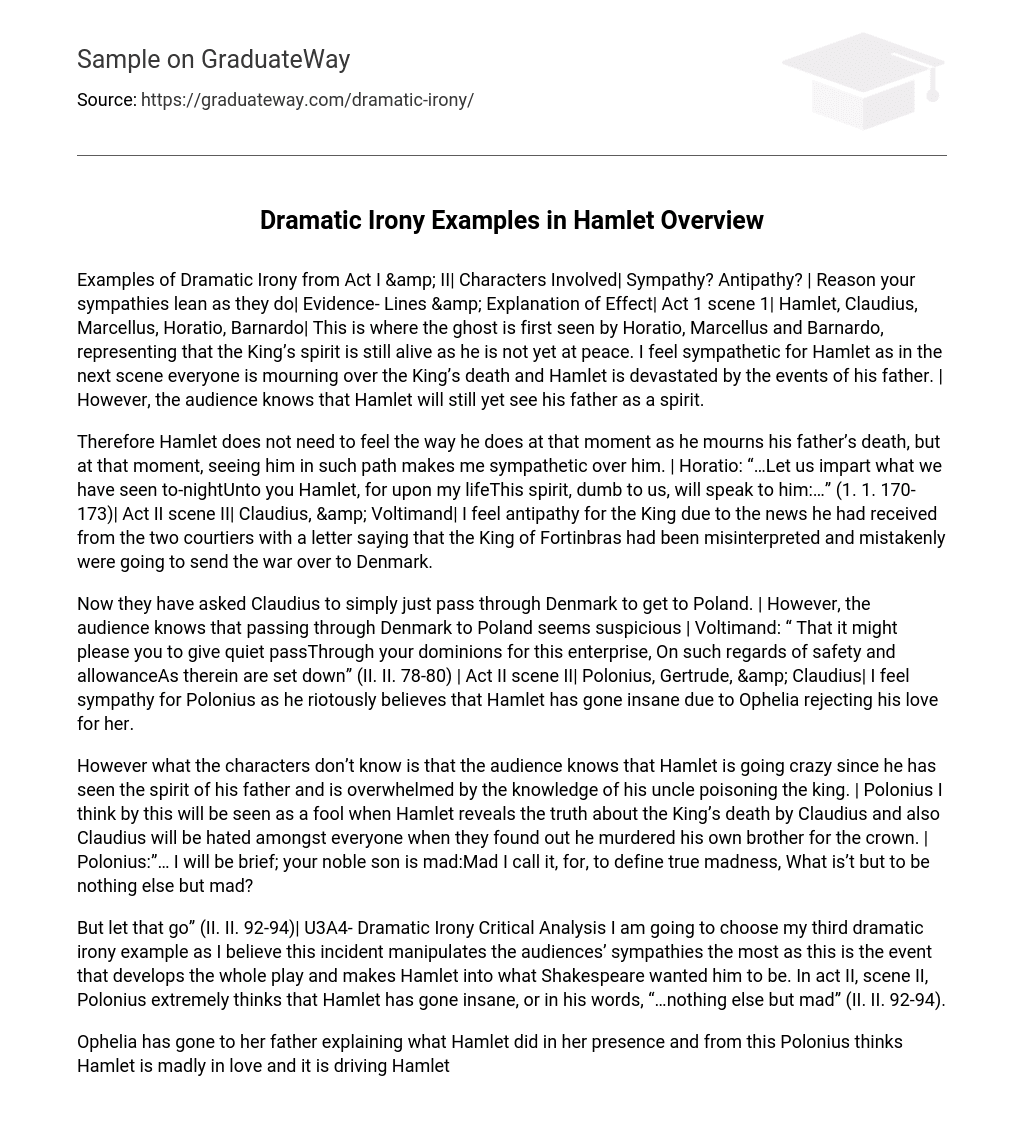Act 1 scene 1. Hamlet, Claudius, Marcellus, Horatio, Barnardo. This is where the ghost is first seen by Horatio, Marcellus and Barnardo, representing that the King’s spirit is still alive as he is not yet at peace. I feel sympathetic for Hamlet as in the next scene everyone is mourning over the King’s death and Hamlet is devastated by the events of his father.
However, the audience knows that Hamlet will still yet see his father as a spirit. Therefore Hamlet does not need to feel the way he does at that moment as he mourns his father’s death, but at that moment, seeing him in such path makes me sympathetic over him. Horatio: “…Let us impart what we have seen to-nightUnto you Hamlet, for upon my lifeThis spirit, dumb to us, will speak to him:…” (1. 1. 170-173)
Act II scene II. Claudius, & Voltimand. I feel antipathy for the King due to the news he had received from the two courtiers with a letter saying that the King of Fortinbras had been misinterpreted and mistakenly were going to send the war over to Denmark. Now they have asked Claudius to simply just pass through Denmark to get to Poland. However, the audience knows that passing through Denmark to Poland seems suspicious. Voltimand: “ That it might please you to give quiet passThrough your dominions for this enterprise, On such regards of safety and allowanceAs therein are set down” (II. II. 78-80)
Act II scene II. Polonius, Gertrude, & Claudius. I feel sympathy for Polonius as he riotously believes that Hamlet has gone insane due to Ophelia rejecting his love for her. However what the characters don’t know is that the audience knows that Hamlet is going crazy since he has seen the spirit of his father and is overwhelmed by the knowledge of his uncle poisoning the king. Polonius I think by this will be seen as a fool when Hamlet reveals the truth about the King’s death by Claudius and also Claudius will be hated amongst everyone when they found out he murdered his own brother for the crown. Polonius:”… I will be brief; your noble son is mad:Mad I call it, for, to define true madness, What is’t but to be nothing else but mad? But let that go” (II. II. 92-94
U3A4- Dramatic Irony Critical Analysis. I am going to choose my third dramatic irony example as I believe this incident manipulates the audiences’ sympathies the most as this is the event that develops the whole play and makes Hamlet into what Shakespeare wanted him to be. In act II, scene II, Polonius extremely thinks that Hamlet has gone insane, or in his words, “…nothing else but mad” (II. II. 92-94).
Ophelia has gone to her father explaining what Hamlet did in her presence and from this Polonius thinks Hamlet is madly in love and it is driving Hamlet insane due to the rejection of Ophelia. Therefore from this, Polonius informs Hamlets uncle, the new King, and Hamlet’s mother who is newly wed to Hamlet’s uncle which they assume increases his insanity along with what Polonius’ explanation of why he is insane. This may manipulate the audience into thinking Hamlet really is going insane. However, the audience knows that Hamlet knows Claudius has poisoned the King so he can get to crown.
Therefore the audiences can prophesize that Hamlet will make a plan to bring Claudius into discovery of the true way the King died. Which will then bring sympathy to the King as he will be caught and therefore cause sympathy to the Queen; most likely. This develops the character of Hamlet as now everyone will assume he is insane and therefore he reacts oddly on everyone and they will just try to ignore him or not be around him; allowing him to be free from Claudius’ watch and be able to plan his revenge against him.
This develops the plot also, as Claudius does not want to take any chances in having the possibility of Hamlet discovering what Claudius actually did to the King therefore prevents Hamlet from going back to school and therefore having his eye on him around Denmark. I believe the new King will plan to kill Hamlet as well. However, Hamlet knows he will attempt to do so I’m sure. So the first two scenes of Hamlet are what thickens the plot and theme of the play.





